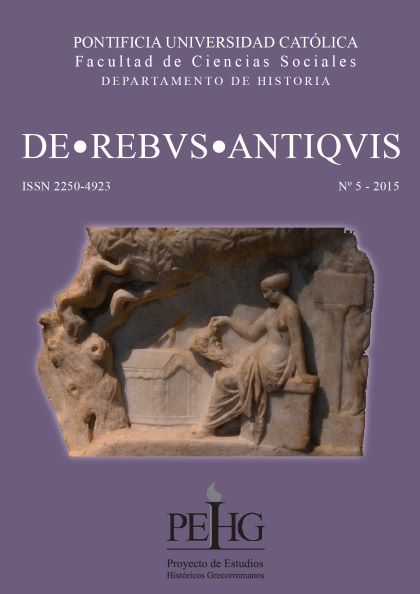La construcción político-social del βάρβαρος en el mundo helénico. Los símbolos y/o signos identitarios que condujeron a la construcción del “nosotros” helénico.
Palabras clave:
Conceptos polívocos, heterofonía, βάρβαρος, etnónimo y/o exónimo, helenos y bárbaros como contrarios asimétricosResumen
El tema de este trabajo nos pone en el camino, estudio y reflexión sobre la construcción del concepto de “bárbaro” como oponente, contrario o antagonista de “heleno”. Esta construcción requirió de los autores de la época la necesidad de darle forma sustantiva al concepto de “heleno”, que no solo fue una figura retórica, sino un “signo identitario” importante. La afirmación de la identidad de los triunfadores de las Guerras Médicas los puso en la necesidad ideológica y política de reforzar el concepto de “heleno” desde el discurso, tal como lo habían hecho en su momento por las armas. Heródoto mismo nos indica que helenos y bárbaros son, en principio, diferentes, incluso representan regiones o espacios diferentes dentro de la ecúmene. La diferencia de lenguaje en el siglo V a. C, evolucionó hacia una forma de espacio. Aquellos que no hablaban griego fueron considerados atrasados, rudos, rebeldes e intelectualmente inferiores.Descargas
Citas
BIBLIOGRAFÍA
Fuentes primarias:
ARISTÓTELES (1988). Política. Madrid: Gredos
ESQUILO (1997). Los Persas. Párodos. Barcelona: Gredos
HERÓDOTO (2000). Historias. Barcelona: Gredos
HOMERO (2000). Ilíada. Barcelona: Gredos.
Bibliografía citada:
AMÉS, C. (2010). La construcción del bárbaro en el mundo clásico: las diferencias entre Grecia y Roma. Revista electrónica de Ciencias Humanas, 8 (Universidade Federal de Goias).
BUONO CORE, R. (2009) ¿La barbarie ¿una acusación recíproca? En: AMÉS, C. & SAGRISTANI, M. (Comps.). Estudios Interdisciplinarios de Historia Antigua II. Córdoba: Encuentro Grupo Editor.
DAUGÉ, I. (1981) Le barbare. Recherches sur la conception romaine de la barbarie et de la civilisation. Bruxelles: Latomus.
FINLEY, M. (1974). Uso y abuso de la Historia.Barcelona: Crítica.
GARCÍA GUAL, C. (2006). Historia, novela y tragedia. Madrid: Alianza,
HALL, E. (1989). Inventing the barbarían. Greek self-definition through Tragedy. Oxford: Clarendon Press.
KOSELLECK, R. (2012). Historias de conceptos. Estudios sobre semántica y pragmática del lenguaje político y social. Madrid: Trotta.
LESGART, C. (2012). Las metáforas y los conceptos. Ensayo en honor a Guillermo O’Donnel. Temas y Debates, 24 (Universidad Nacional de Rosario), pp. 49-58.
OSBORNE, R. (2002). La Grecia clásica 500-323. Barcelona: Oxford University Press.
SANTIAGO, Rosa-Araceli. (1998). Griegos y bárbaros: arqueología de una alteridad. Faventia, 20/2, pp. 33-45.
Descargas
Publicado
Cómo citar
Número
Sección
Licencia










